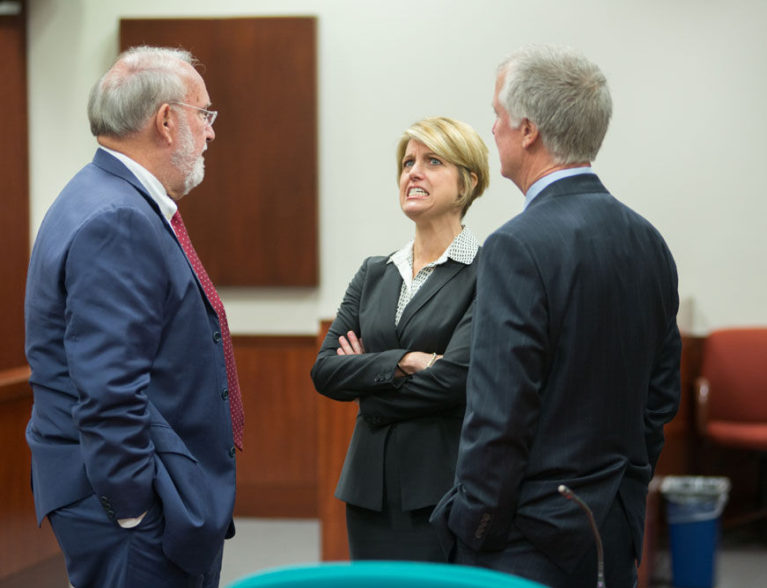
VERO BEACH — Legal teams representing the City of Vero Beach and the Town of Indian River Shores exchanged arguments Wednesday morning for nearly two hours while Judge Cynthia Cox questioned them in preparation for issuing her ruling in two to six months on whether to dismiss one or more of the four counts filed in the electric utilities lawsuit by the Shores against Vero.
The first count of the suit asks the court to issue a declaratory statement clarifying what powers the Shores has, as a sovereign municipality, after its franchise agreement with Vero for electric utility service expires on Nov. 6, 2016. The Shores is hoping to have its municipal powers affirmed, and then to petition to have Vero’s electric territory redrawn based upon the court ruling. Vero is hoping to prevail and keep all 34,000 of the customers in its system.
Three other counts deal with matters of anticipatory breach of contract, breach of contract and damages for those breaches, which include an allegation that Vero has mismanaged its electric utility, resulting in unreasonably high rates.
Robert Scheffel “Schef” Wright of Tallahassee and Kathryn Cowdery of the Florida Public Service Commission argued that the court either did not have jurisdiction over the matters in question in the first two counts, repeating numerous times that the PSC has “exclusive and superior jurisdiction” over matters of electric service territories.
Renowned trial lawyer John Frost, of Bartow, argued that the Shores’ complaints were either inadequately or inappropriately posed in the last two counts, that the Shores is asking the court to engage in rate making, and that every individual ratepayer in the Town should be named as plaintiffs in the suit.
Bruce May and Karen Walker, of the Tallahassee firm of Holland and Knight, defended the Circuit Court’s jurisdiction in the case, saying that the question is not a territorial matter at all, but instead a constitutional question about the inherent powers of a municipality over public lands, and over who may use those public lands to do business as a utility within the borders of the municipality.
Walker outlined how the Shores has met the threshold to have the court hear its complaints of anticipatory breach and of breach of contract, and argued it is proper to seek damages should Vero be found in breach of the franchise agreement.
Judge Cox asked a multitude of detailed, thoughtful questions of both legal teams and acknowledged valid points made on both sides. She also took detailed notes on the dozens of cases cited by both the plaintiffs and the respondents’ attorneys as precedent supporting their side.
She said she would take everything presented into consideration and rule on Vero’s motion to dismiss “in no less than 60 days, but it will not be more than six months.”
The Shores filed suit in July 2014, but the dispute was put on hold for nine months while a state-mandated conflict resolution process proceeded in an attempt to resolve the case. Efforts were unsuccessful, as Vero’s promises of lower rates did not materialize and Shores officials, plus County officials sitting in on mediation sessions, did not feel their concerns were adequately addressed.
The collapse of Vero’s effort to sell its electric system to Florida Power and Light led the Shores to what officials say is a last resort in court. Working parallel to this Circuit Court suit is a related Indian River Board of County Commissioners appeal to the Florida Supreme Court of a February decision of the PSC and, more recently, an offer by FPL to purchase the 2,900 Shores customers and equipment from Vero for $13 million, plus an FPL investment of $12 million in transmission upgrades.
Vero is also working on amending its 2008 bulk power deal with the Orlando Utilities Commission in an effort to reduce costs by up to $9 million per year, or roughly 10 percent of Vero electric’s annual operating budget.



